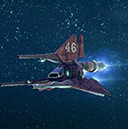Difference between revisions of "Fighter hangar"
| Line 13: | Line 13: | ||
== Chance of success == | == Chance of success == | ||
| − | Each round of combat a unit fires all its weapons. Each of the weapons is fired once on the target that is assigned at that time. The probability of reaching the goal depends on several factors: | + | Each round of combat a unit fires all its weapons and attacks with all its fighters. Each of the weapons is fired once on the target that is assigned at that time. The probability of reaching the goal depends on several factors: |
| − | {{Note | Chance of success = Base probability 100% + bonus fighter accuracy | + | {{Note | Chance of success = Base probability 100% + target size modifier + bonus fighter accuracy + target figher defense modifier + veterancy modifier + combat ability modifier}} |
=== Modifier for veterancy === | === Modifier for veterancy === | ||
Revision as of 23:56, 5 October 2017
| Fighter hangar | |

| |
| Characteristics | |
| Manufacturable | yes |
| Installation | |
| Planetary base | yes |
| Space station | yes |
| Ship | yes |
The fighter hangars provide a squadron of single-seater or two-seater ships capable of causing massive damage on bases or capital ships. Their mechanics of combat vary with respect to that of a space weapon.
Unlike cannons, the base probability of success in a fighter attack is 100%. This probability is reduced by the defense of fighters of the unit to which it attacks (base or ship) and bonused by its precision. In this way, Eagle interceptors with 50% accuracy will have a basic attack probability of 150%. If they were attacking a ship with four gatling guns granting an 80% fighter defense, the final odds of the attack would fall to 70%.
Eagle interceptors, and especially the Havok bombers, have a brutal firepower. Giving a very large combat advantage to a combat force that has fighters but its opponent lacks countermeasures. In addition, the interceptors also increase the defense of fighters of the unit to which they belong. Two Eagle MKII hangars would provide a defense against 120% fighters.
Chance of success
Each round of combat a unit fires all its weapons and attacks with all its fighters. Each of the weapons is fired once on the target that is assigned at that time. The probability of reaching the goal depends on several factors:
Modifier for veterancy
Each veterancy level above recruit increases the probability of success by 20%. An elite ship will have a bonus of 80% to the shot.
Modifier for combat capability
Combat capability below 100% reduces the chance of success by the same percentage. Thus, a combat capability of 87% will reduce the chance of success by 13%.
Object list
| Name | Power | Personnel | Space | Production | Install | Mass | Installation time | Fighter capacity | Fighter deployment | Estructure | Maintenance |
|---|---|---|---|---|---|---|---|---|---|---|---|
| Fighter hangar I | 100 | 100 | 250 | 18m | 24m | 2,500 | 4h | 2 | 2 | 800 | 10 |
| Fighter hangar II | 100 | 100 | 250 | 18m | 24m | 2,300 | 4h | 2 | 2 | 800 | 10 |
| Fighter hangar III | 100 | 100 | 250 | 18m | 24m | 2,100 | 4h | 2 | 2 | 800 | 10 |
| Fighter station I | 400 | 400 | 2000 | 24m | 48m | 2,500 | 8h | 12 | 12 | 2,000 | 40 |
| Fighter station II | 400 | 400 | 2000 | 24m | 48m | 2,500 | 8h | 14 | 14 | 2,000 | 40 |
| Fighter station III | 400 | 400 | 2000 | 24m | 48m | 2,500 | 8h | 16 | 16 | 2,000 | 40 |
| Fighter ministation | 200 | 200 | 1000 | 12m | 18m | 2,500 | 3h | 5 | 5 | 1,000 | 20 |